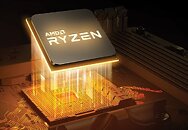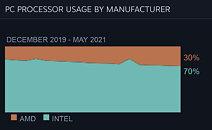Friday, June 4th 2021

AMD Breaks 30% CPU Market Share in Steam Hardware Survey
Today, Valve has updated its Steam Hardware Survey with the latest information about the market share of different processors. Steam Hardware Survey is a very good indicator of market movements, as it surveys users that are spread across millions of gaming systems that use Valve's Steam gaming platform. As Valve processes information, it reports it back to the public in a form of market share of different processors. Today, in the Steam Hardware Survey for May 2021, we got some interesting data to look at. Most notably, AMD has gained 0.65% CPU market share, increasing it from the previous 29.48% to 30.13%. This represents a major move for the company, which didn't own more than 30% market share with its CPUs on Steam Survey in years.
As the Steam Survey tracks even the market share of graphics cards, we got to see a slight change there as well. As far as GPUs go, AMD now holds 16.2% of the market share, which is a decrease from the previous 16.3%. For more details about Steam Hardware Survey for May 2021, please check out Steam's website here.
Source:
Steam Hardware Survey
As the Steam Survey tracks even the market share of graphics cards, we got to see a slight change there as well. As far as GPUs go, AMD now holds 16.2% of the market share, which is a decrease from the previous 16.3%. For more details about Steam Hardware Survey for May 2021, please check out Steam's website here.


104 Comments on AMD Breaks 30% CPU Market Share in Steam Hardware Survey
Also, do you know that the console SoCs are coming out of AMD's allocation at TSMC, or does Sony and Microsoft have their own allocation with TSMC?
The media is reporting it as AMD allocation, but since we don't have any business insight here and neither do they, we don't know how it works.
And why would AMD focus on Apple? They use a bunch of old hardware and there's no shortage on those nodes as such.
Sorry, but unless you have some actual facts here, this is just assumptions that you guys are making.
The point is, this is a Steam survey about PC hardware, it has nothing to do with consoles.Define a lot. Those are all fairly low volume products, with the possibly exception being the MacBook Pro.
CPUs
3xxx series Ryzen was the superior chip to anything on the market in nearly every aspect which meant everyone wanted them. 5xxx series basically turns it all up to 11 with intel misfiring on both 10th and 11th gen releases of Core.
In the server market Ryzen has been more than viable if not the superior choce in nearly all aspects especially since Rome.
GPUs
6xxx series is very much a viable product, however in recent times they have been very hit and miss. 5xxx series was a decent product but there was a lot of competition from Nvidia up and down the product stack. Radeon VII was something they could say they released but was more paper release vs a mass release.
Consoles
Guaranteed sales, Guaranteed Income and contractually obligated to deliver quite a few processors to both Sony and Xbox especially with BOTH of them releasing consoles very recently especially of differing designs in regards to Xbox so basically 3 differening SOCs required.
So where do you divide your alotment of wafers? Into areas that you know you are going to make you money and are a really safe bet or commit more to a "possible" product stack that are a complete unknown in terms of market acceptance and performance of your competition. 6xxx series availability is suffering from the success of the CPU dept literally being the goose who laid the golden egg for the last 2+ years plus the heightend demand for new SOCs from the new consoles. I can imagine AMD were like "wait people reallly really want the 6xxx series? TSMC We need MOAR!!!" while TSMC is going "Who Doesnt?"
So of those 79 million how many Exynos chipsets are included in those numbers? Are all the Professional GPUs included in those as well? (I suspect yes) Are the Console GPUs also included? (Again I suspect yes)
www.eweek.com/mobile/amd-sells-handset-division-to-qualcomm-for-65-million/
However, at this point the market is cold. There aren't any breakthroughs, pretty much all phones are the same and nobody cares about them anymore as they are exactly the same flat rectangles. Only Apple and probably Samsung are making some serious money, meanwhile others like Xiaomi, Huawei, BBK are just racing to the bottom and trying to one up each other on price. The problem is that smartphones are already good and they are basically a commodity. You can't just add one truly great feature and get all the dough anymore. Just having a good camera like Nokias did, isn't enough, just playing mp3s like Sony Ericssons did, isn't enough. The only real innovation we will see is when someone will make a new and better battery type, otherwise smartphone market is too stagnant. Perhaps it can work out for you if you don't make phones and only supply parts, but otherwise it would be a horrible idea to enter this market. I think that AMD just missed most of their possible profit there during the gold era of smartphones, where everybody wanted one no matter how shit and low spec it was. Right now buying a smartphone is no more amusing than buying a microwave oven.
en.wikipedia.org/wiki/Imageon
In fact, it wasn't until 2008 that they had an SoC, rather than a discrete mobile graphics chip. So it's actually impossible to say what could've been, considering that they only had a single SKU with two different sub SKUs that was a complete solution that would've been suitable for phones.And we know this how? If AMD hadn't sold what they saw as a costly ATI BU with very few customers, then maybe they would just have shuttered it altogether.
Did they sell it too cheap? Most likely, but the world wasn't going crazy for mergers back then as it has been doing the past few years.
Also, what says Qualcomm wouldn't have made their own GPU or continued to license technology from AMD?
It's fun to speculate, but that's all this is, speculation.
Stop the insults/name calling.
Thank You, on-topic civil discussions, please.
Imagine all the extra costs they would've had today if they still owned GlobalFoundries, it would've meant AMD would've gone bust a long time ago.
If they hadn't bought ATI, there would most likely be no AMD today either, even though they spent way too much money on ATI, which among other things is part of the reason they were doing so poorly for a while.
Maybe there would've been another GPU alternative, but even at the time, no-one else would've been able to provide as profitable discrete graphics products as ATI, as most of the competition was already dead. It was another company that was ahead of its time and clearly didn't deliver what was promised.
Not sure it made sense that they bought SeaMicro, as I don't know what kind of know-how it brought to AMD, but product wise it didn't seem to bring anything really valuable.
All that said, if you take a look at Intel, you'll see that they've made an equally amount of bad choices of the years, they just had more capital and more market share, so it has been easier for them to overcome the bad choices they made and move on from there.